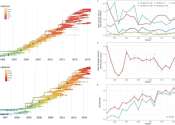Visa rules jeopardize HIV management, study finds
A Monash University sexual health expert has warned that an unintended consequence of Australia's migration rules could compromise Australia's goal to end the HIV epidemic by 2030.
Apr 30, 2024
0
1
A Monash University sexual health expert has warned that an unintended consequence of Australia's migration rules could compromise Australia's goal to end the HIV epidemic by 2030.
Apr 30, 2024
0
1

Mayotte, a French island in the Indian Ocean, said Sunday it had identified a total of 26 cases of cholera, stretching its care capabilities to the limit.
Apr 29, 2024
0
0

During epidemics of Ebola, COVID-19, Zika and other public health emergencies, effective communication of public health messages is crucial to control the spread of disease, maintain public trust, and encourage compliance ...
Apr 25, 2024
0
0

New research to be presented at this year's European Congress on Obesity held in Venice, Italy (12–15 May), shows that having obesity in childhood is associated with more than double the risk of later developing multiple ...
Mar 28, 2024
0
0

Puerto Rico's health secretary declared an epidemic on Monday following a spike in dengue cases.
Mar 26, 2024
0
0

Amid an obesity epidemic in the United States, you may have heard of efforts to eliminate "food deserts," or areas with few healthy food options, and limit fast-food chains near where people live.
Mar 18, 2024
0
28

US officials announced Thursday an agreement with Endo Health Solutions (EHSI) to settle civil and criminal claims over the mislabeling of its pain reliever drug Opana, which has contributed to the opioid epidemic.
Feb 29, 2024
0
1

Peru declared a health emergency in most of its provinces on Monday due to a growing number of dengue cases that are occurring at a time of higher than usual temperatures caused by the El Nino weather pattern.
Feb 27, 2024
0
0

Researchers have shed new light on how viral evolution, population immunity, and the co-circulation of other flu viruses shape seasonal flu epidemics.
Feb 13, 2024
0
33

Publicis Health will pay $350 million to settle charges from US states that its "predatory and deceptive marketing strategies" worsened the opioid epidemic, New York's top prosecutor said Thursday.
Feb 1, 2024
0
1

In epidemiology, an epidemic (from Greek epi- upon + demos people) occurs when new cases of a certain disease, in a given human population, and during a given period, substantially exceed what is "expected," based on recent experience (the number of new cases in the population during a specified period of time is called the "incidence rate"). (An epizootic is the analogous circumstance within an animal population.) In recent usages, the disease is not required to be communicable; examples include cancer or heart disease.
This text uses material from Wikipedia, licensed under CC BY-SA